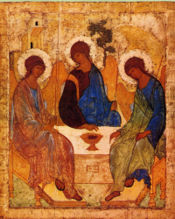Difference between revisions of "Holy Trinity"
m (es translation added) |
|||
| Line 11: | Line 11: | ||
[[Category:Theology]] | [[Category:Theology]] | ||
| + | |||
[[el:Αγία Τριάδα]] | [[el:Αγία Τριάδα]] | ||
| + | [[es:Santísima Trinidad]] | ||
[[ro:Sfânta Treime]] | [[ro:Sfânta Treime]] | ||
| − | |||
Revision as of 20:08, November 18, 2007
| This article forms part of the series Introduction to Orthodox Christianity | |
| Holy Tradition | |
| Holy Scripture The Symbol of Faith Ecumenical Councils Church Fathers Liturgy Canons Icons | |
| The Holy Trinity | |
| God the Father Jesus Christ The Holy Spirit | |
| The Church | |
| Ecclesiology History Holy Mysteries Church Life | |
| Edit this box | |
Orthodox Christians worship the Father, Son, and Holy Spirit—the Holy Trinity, the one God. Following the Holy Scriptures and the Church Fathers, the Church believes that the Trinity is three divine persons (hypostases) who share one essence (ousia). It is paradoxical to believe thus, but that is how God has revealed himself. All three persons are consubstantial with each other, that is, they are of one essence (homoousios) and coeternal. There never was a time when any of the persons of the Trinity did not exist. God is beyond and before time and yet acts within time, moving and speaking within history.
God is not an impersonal essence or mere "higher power," but rather each of the divine persons relates to mankind personally. Neither is God a simple name for three gods (i.e., polytheism), but rather the Orthodox faith is monotheist and yet Trinitarian. The God of the Orthodox Christian Church is the God of Abraham, Isaac and Jacob, the I AM who revealed himself to Moses in the burning bush.
The source and unity of the Holy Trinity is the Father, from whom the Son is begotten and also from whom the Spirit proceeds. Thus, the Father is both the ground of unity of the Trinity and also of distinction. To try to comprehend unbegottenness (Father), begottenness (Son), or procession (Holy Spirit) leads to insanity, says the holy Gregory the Theologian, and so the Church approaches God in divine mystery, approaching God apophatically, being content to encounter God personally and yet realize the inadequacy of the human mind to comprehend Him.
The primary statement of what the Church believes about God is to be found in the Nicene-Constantinopolitan Creed.
